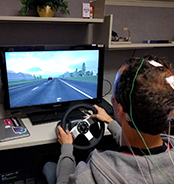
|
 |

|
The mission of the Fatigue Countermeasures Lab is two-fold:
1) to provide a better understanding of sleep-related issues as they affect human performance and safety;
2) to develop countermeasures to improve safety, performance, and aid in overall mission success.
|

|
 |

|
6/5/2025- NASA’s Dr. Erin Flynn-Evans and Dr. Rachel Jansen Interviewed by the Washington Post to Discuss the Challenges of Sleeping in Space. To read more about this story, please click here.
|
3/17/2025- NASA’s Dr. Erin Flynn-Evans Interviewed by the Mercury News to Discuss the Negative Effects of Daylight Saving Time and Possible Countermeasures. To read more about this story, please click here.
|
11/15/2024- Final Report from FAA-Commissioned Panel on Air Traffic Controller Fatigue Published in the Journal of the American Medical Association. To read more about this story, please click here.
|

|
 |

|
The Fatigue Countermeasures Laboratory provides an opportunity for undergraduate students to engage in a variety of research projects. Summer internships last 10-12 weeks beginning in June and ending in August.
> Summer Internship Program Information
> See what our current/past interns have accomplished
|
|
 |

|
 |
| |
 |
 |
We are conducting a study to evaluate roster design and fatigue in short-haul commercial aviation
|
 |
 |
We are evaluating bio-mathematical models that were designed to predict alertness and performance in order to determine how well such models perform when compared to actual performance in a variety of scenarios.
|
 |
 |
We are conducting a study in the Human Exploration Research Analog (HERA), which is an isolated and confined habitat located at Johnson Space Center.
|
|
|
 |
If you are interested in participating in a NASA Fatigue research study, or would like to be notified when we publish the results of studies, please click on the links below.
- General Population
- Pilots |
 |
 |
|
 |
 |
The Fatigue Countermeasures Laboratory at NASA Ames Research Center studies the relationship between sleep loss, circadian desynchrony, cognitive function, and alertness. Performance detriments have been shown to occur in response to circadian desynchrony (being out of sync with one's internal clock), acute sleep loss (insufficient sleep over a short period of time), chronic sleep loss (insufficient sleep over a long period of time), and sleep inertia (grogginess following sleep).
Countermeasures for these effects improve safety, performance, and aid in the overall success of a mission's goal. The primary population of interest is aviation pilots and astronauts, however the Fatigue Countermeasures Laboratory lends its expertise to diverse populations. |
|